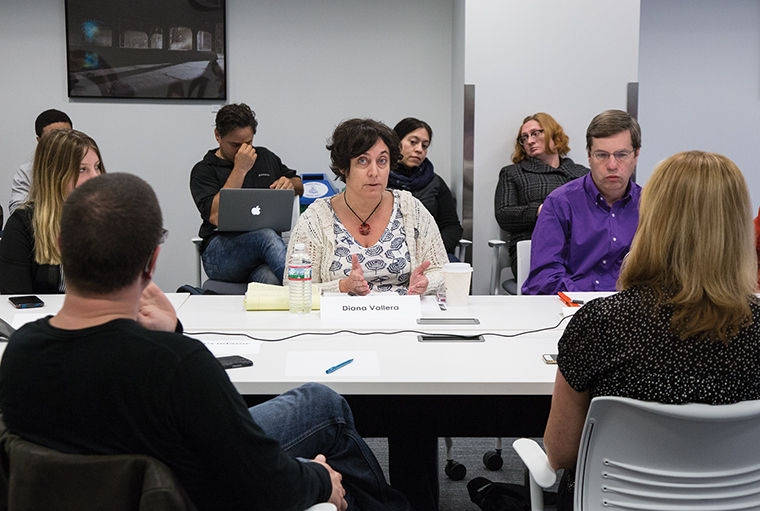P-Fac wins years-long case against college
The Part-Time Faculty Union led by Diana Vallera, an adjunct professor in the Photography Department and P-Fac president, won its case March 24.
April 11, 2016
The National Labor Relations Board has ruled in favor of the college’s Part-Time Faculty Union in a dispute over whether the college was within its rights to cut the number of credit hours taught by adjunct faculty—thereby reducing their pay—without negotiating the decision.
In its March 24 finding, the NLRB ruled by a margin of 2-1 that Columbia violated federal labor laws in 2010 and 2011 by unilaterally reducing the number of credit hours for 10 courses.
In a separate but related decision, the NLRB also ruled that the college illegally took steps against Diana Vallera, an adjunct professor in the Photography Department and P-Fac president, in 2012 when it reduced her teaching load and investigated her for alleged “misconduct” when she complained the college had put her home under surveillance, a claim that was never substantiated, as reported Sept. 4, 2012 by The Chronicle.
The disciplinary actions regarding surveillance were later dropped on Nov. 15, 2012, during a meeting between the administration and Vallera.
In the pay reduction case, P-Fac challenged the college’s decision to reduce credit hours while it simultaneously declined to negotiate for several months without any detailed resolution of the issue. The NLRB said this was a violation of federal labor law.
“[This case] reinforces that the college has to give us a chance to bargain when they want to do certain things,” said Michael Persoon, P-Fac’s attorney at Despres, Schwartz & Geoghegan, Ltd.
In its ruling, the NLRB ordered Columbia to reimburse P-Fac for its negotiating expenses because it found the college’s actions “egregious.” The college was also ordered to reimburse the affected part-timers for the wages they lost due to the credit-hour reductions.
Cara Birch, spokeswoman for the college, said the negotiations between P-Fac and the college for a new collective bargaining agreement happened during 2011–2012 under an old administration. Birch said the college is exploring various options including an appeal to the federal courts.
“The college disagrees with the majority’s decision and acknowledges the well-reasoned and detailed dissenting opinion,” Birch said. “However, the college continues to work with P-Fac to resolve any ongoing matters, and strives for positive outcomes for the campus community as a whole.”
A provision of P-Fac’s contract states that administrators have the right “to plan, establish, terminate, modify and implement all aspects of educational policies and practices, including … the establishment, expansion, subcontracting, reduction, modification, alteration, combination or transfer of any job, department, program, course, institute.”
The college argued that the provision gave Columbia the right to change the credit hours. However, the NLRB ruled that when the college changed adjuncts’ credit hours for courses, it directly affected adjuncts’ wages and could not be viewed as “managerial discretion.” The ruling stated the college cannot change credit hours without bargaining.
The NLRB ruling orders the college to resume negotiations on the issue with P-Fac and to compensate part-time faculty members who lost wages due to the college reducing the adjunct faculty members’ credit hours.
“This ruling by the National Labor Board confirms and acknowledges the long history of illegal practices by Columbia College Chicago,” Vallera said in a March 30 letter to P-Fac.








